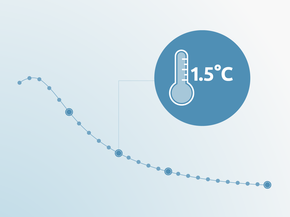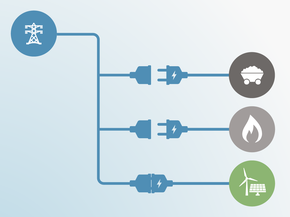Country summary
Overview
The new German government, in power since December 2021, significantly accelerates domestic climate policy implementation. If all measures planned in the coalition contract were implemented, Germany would get close to its domestic emissions target of a 65% reduction below 1990 levels in 2030. New renewable energy expansion measures and the anticipated coal phase-out by 2030 may lead to Germany overachieving the sectoral target for the electricity sector, but other sectors lag behind.
But even more measures would be necessary to overachieve the 65% target for 2030, as the government has promised, to make a 1.5°C compatible contribution. The government now needs to ensure that in all sectors the planned and new measures are effectively implemented, to overachieve the 2030 targets.
Germany would need to reduce emissions by at least 69% domestically and give significantly more climate finance to other countries for it to be in line with the Paris Agreement 1.5°C limit. The Climate Action Tracker rates Germany’s current policies and targets as overall “Insufficient”.
Measures of the German government to cope with the illegal Russian invasion in Ukraine and related energy security issues are partially positive with new plans to expand renewables, but also partially counterproductive to climate policy. Examples are the agreed temporary tax reduction on petrol and diesel, raising the commuter support or the fast expansion of LNG import infrastructure, which risks a lock-in of fossil fuels.
Chancellor Scholz also proposed supporting the extraction of fossil gas in Senegal and rolling back the decision to stop financing or supporting fossil fuel projects abroad. If this proposal were implemented it would strongly contradict the G7 Environment Ministers plan to no longer support fossils overseas after 2022, as well as what is needed for a globally just and sustainable transition to 1.5 pathways.
The CAT rates Germany’s overall climate targets, policies and finance as “Insufficient”. The “Insufficient” rating indicates that Germany’s climate policies and commitments need substantial improvements to be consistent with the Paris Agreement’s 1.5°C temperature limit.
We rate Germany’s 2030 emissions reduction target as “Almost sufficient” when compared to modelled emissions pathways, consistent with 2°C of warming, and “Insufficient” when compared with its fair-share contribution to climate action. Germany should both further increase its emissions reduction target and provide significantly more and predictable finance to other countries to meet its fair-share contribution. To achieve its target, Germany needs to enhance its policies and actions. With current legislation it would miss its 2030 target; with the new government’s plans, Germany will likely just about meet, but not overachieved it.
We rate Germany’s policies and actions until 2030 “Almost sufficient”. We project that implemented policies and actions will lead to emissions reductions of between 49-51% below 1990 levels by 2030 excl. LULUCF. This falls short of Germany’s 2030 target of an at least 65% reduction below 1990 levels.
The new government agreed on a coalition contract in December 2021. If all measures in the coalition contract were implemented, Germany would get close to its 2030 emissions target of a 65% reduction below 1990 levels. Even more measures would be necessary to overachieve the 2030 target as it was promised by the government.
Germany’s emissions in 2021 rebounded after a dip in 2020, a dip that was mostly related to the impacts of COVID-19 on the economy but also affected by effects of the coal phase-out decision. Our updated estimates project higher 2030 emissions than our previous projections, mainly because of a smaller impact on the economy of COVID than expected, a corrected estimate for industry and higher electricity demand than in the previous scenario.
The new German government has put a focus on climate change mitigation, through restructuring ministries, budgetary measures, revisions of targets in different sectors and proposed legislative measures. Not all are yet implemented, but there is a promising trend, particularly in the area of renewable energy.
Pushing renewable energy is a priority of the new German government and is approached in a very comprehensive manner through increased targets and planned legislative measures that aim at overcoming very specific challenges for renewable energy in Germany. This approach, if implemented effectively, would be a game changer for renewable energy in Germany, and could serve as a good example for other countries. The new government also aims to phase out coal by 2030, ahead of the previously agreed timelines. This timeline would be compatible with what’s needed to stay below 1.5°C, but the relevant legislation still needs to be put in place to implement it.
In the energy sector, the dependency on fossil gas is a big problem. As a reaction to the Russia’s illegal invasion of Ukraine and the need to reduce imports from Russia, Germany is looking to expand its LNG import infrastructure and liaise with other countries, including Qatar, the US and Senegal. Such partnerships not only risk the German economy becoming locked into the unsustainable use of a fossil fuel, but also threatens the necessary transition in the partner countries, and comes with other questions around international justice and geopolitical risks. Instead, an increased focus on efficiency, electrifying demand and avoiding overconsumption is necessary.
The measures planned by the new government for demand sectors are less comprehensive than for renewable energy. Increased funding for renovation is an important element, but CAT research shows that a comprehensive approach is required for this financing to be effective. In the transport sector, Germany mainly pushes electric vehicles and some investments in train infrastructure. Both will be important but remain insufficient to meet the sectoral targets, let alone get on a sustainable 1.5°C pathway.
The full policies and action analysis can be found here.
We rate Germany’s 2030 reduction target of 65% below 1990 levels as “Almost sufficient” when compared to modelled emissions pathways. The “Almost sufficient” rating indicates that Germany’s proposed domestic target in 2030 is not yet consistent with the 1.5°C temperature limit but could be with moderate improvements, if changed to 69%. If all countries were to follow Germany’s approach, warming could be held at—but not well below—2°C. While this target represents a significant improvement compared to its previous target, Germany’s new target is not stringent enough to limit warming to 1.5°C and needs further improvement.
The CAT’s assessment of Germany’s total fair share contribution takes into account its emissions reduction target and its climate finance.
We rate Germany’s 2030 target of 65% below 1990 levels excl. LULUCF as “Insufficient” when compared with its fair-share emissions allocation. The “Insufficient” rating indicates that Germany’s fair share target in 2030 needs substantial improvement to be consistent with the 1.5°C temperature limit.
Germany should both further increase its emissions reduction target and provide significantly more and predictable finance to others to meet its fair-share contribution. Germany’s target is at the least stringent end of what would be a fair share of global effort, and is not consistent with the 1.5°C limit, unless other countries make much deeper reductions and comparably greater effort. If all countries were to follow Germany’s approach, warming would reach over 2°C and up to 3°C.
Germany’s international public climate finance contributions are better than most developed countries but still rated insufficient. Germany has committed to increase its climate finance, but contributions to date have been low compared to its fair share as assessed by the CAT. To improve its rating, Germany needs to increase its international climate finance contributions significantly (e.g. by a factor of three), and, most urgently, stop funding fossil fuels abroad. At COP26, Germany signed a declaration to stop financing fossil fuels abroad, but Chancellor Scholz has announced plans to roll back this decision. The CAT rates Germany’s international climate finance “Insufficient”.
Germany’s climate finance is not sufficient to improve the fair share target rating, and the CAT rates Germany’s overall fair share contribution as “Insufficient”.
In June 2021, Germany adopted its 2045 net zero target in its revised climate law. The net zero target generally covers key elements but fails to meet good practice standards for some of them. We evaluate the net zero target as: “Average.” The German government needs to legislate its commitments to include international aviation and shipping emissions and undertake its planning on how to reach the 2045 target to improve its rating to “Acceptable”.
Further analysis
Latest publications
Stay informed
Subscribe to our newsletter






